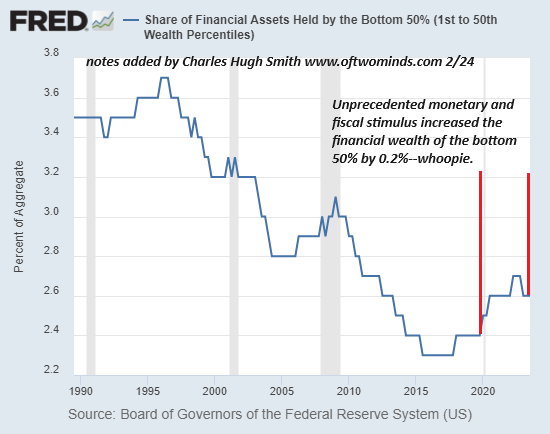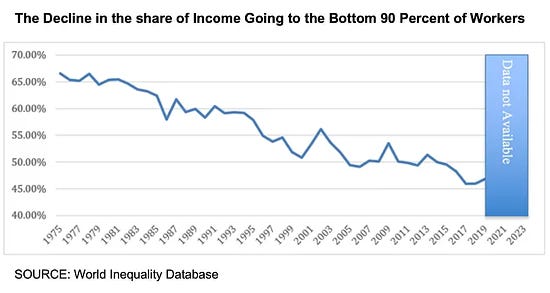A dedicated cadre of readers is devoted to reminding me that I’ve been wrong since 2009, as stocks, housing and GDP have all soared. We skeptics and doom-and-gloomers have all been wrong, and when stocks briefly dip, we’re identified as broken clocks--right on occasion but not for being “right.”
These readers are of course doing well. None are in the bottom 50% of Americans who have already experienced the crash. But since the top 10% dominate the media, both legacy and social media, and they’ve done splendidly in the Everything Bubble that’s been inflating for the past 16 years, then they don’t see the crash the 50% have experienced, for the top 10% live in a completely different world from the bottom 50%, whose experience tracks a third-world country far removed from jetting around the world and complaining about high taxes.
Life has crashed for the bottom 50% since 2009, but since those reporting the “news,” issuing glowing commentary about AI, nuclear power, missions to the Moon, etc., and making big bucks as influencers didn’t experience the crash, it has gone largely unnoticed except for occasional reporting in the legacy and social media: people making substantially more than minimum wage living in vans and cars because they can’t afford the local rents, and similar stories.
In a Snow Paradise, They Live in This Parking Lot People experiencing homelessness can sleep in their cars in this wealthy ski town in Colorado, but only if they have a job.
The Invisible Man We see right through the unshowered soul living in a car by the beach, or by the Walmart, or by the side of the road. But he’s there, and he used to be somebody. He still is. A firsthand account of homelessness in America.
An American physician with nearly 50 years of experience brought me up short when he reported that for many Americans, the healthcare they receive is equivalent to what third-world residents receive. Third World--which evokes grinding poverty, inescapable immiseration, failing infrastructure, a neofeudal divide between the few wealthy and the many poor, a society with no limits on exploitation and profiteering ruled by elites that are not merely corrupt but also incompetent--has been replaced by the sanitized developing world, but the point here isn’t the trend to sanitize repellent realities with textual tropes, it’s the refusal of America’s top 10% to acknowledge that for many of the bottom 50%, America under their leadership is a third world nation.
The top 10% cling to the soaring stock market and rising GDP as markers of the nation’s robust economy and success to avoid dealing with lived reality, as if their fairy-tale belief that soaring stocks means life is good is actually real; if you’re falling behind, well, work harder, work smarter, be more frugal--be more like us, in other words.
While the top 10% busy themselves with using AI to improve work flow, obsessing over geopolitics and the decay of the perks of their Titanium credit card, other Americans are concerned with finding a second or third side-hustle as the soaring costs of utilities, rent, auto insurance and repairs, childcare and healthcare are forcing choices nobody wants to make: what not to pay.
As the cracks widen, it gets harder not to avoid falling into one. So much of everyday life in America is now a parody of precarity that is right out of a black-comedy script of a nation blindly telling itself that all is well because AI is amazing and we’re going back to the Moon while families are abandoning their beloved pets because they cannot afford four-figure vet bills.
The top 10%, secure in their bubble, don’t even notice that private equity is snapping up vet clinics precisely because people will pay whatever it takes to care for their pet. This is exploitation and profiteering on a scale that makes a mockery of the fantasy that ours is an economy of opportunity.
The withdrawal of the top 10% from the bottom 90% is not a new trend; it’s merely gathered momentum. Author Christopher Lasch described this class bifurcation decades ago in his 1995 book The Revolt of the Elites and the Betrayal of Democracy.
It’s important to the top 10% to maintain the illusion that they didn’t benefit from conditions that are no longer available to all. They are loathe to admit that the US economy is now one in which the bottom 90% work to serve the top 10%, who account for half of all consumer spending and the lion’s share of discretionary spending--all the goodies such as vacations overseas, mileage upgrades to business class, etc.
As I outline in my recent books, Progress is illusory, a myth that cloaks the reality that life is getting more difficult, not easier: this is Anti-Progress, the opposite of Progress.
This reality is fragmented by distractions and addictions and the busy-ness of trying to do all the unpaid shadow work now required to keep everything glued together. All that was once authentic has been slowly replaced by Ultra-Processed Life, artifices that are easier to manage than messy reality.
What happens when people can no longer pay for everything they need to live? If history is any guide, somebody figures out that rather than scattered individuals defaulting here and there, an organized default is the only real power left. If 100,000 tenants in a city all go on a rent strike, withholding rent until there is some recognition of the unviability of the status quo, what’s the response? To evict 100,000 households?
There are many historical examples of general strikes, where those serving the top 10% don’t show up for work. All the real work--not the phony AI work flows--is no longer performed.
When people stop participating in their own servitude, then things change. People can opt out on their own, or they might cooperate in a group opt-out. The point here is the crash that the top 10% didn’t experience and therefore ignore has already happened.
Here’s how the bottom 50% experienced the S&P 500 soaring from 666 in 2009 to 6900 this week. Their share of the nation’s expanding financial wealth is so small it’s signal noise.

The bottom 90% have lost ground. And it’s not because they’re not working hard enough.

Just because we didn’t experience it doesn’t mean there was no crash. Is this uncomfortable? Undoubtedly. But more importantly--what’s our response?

